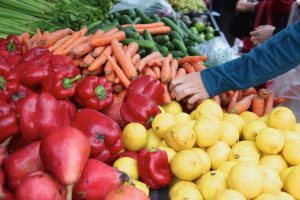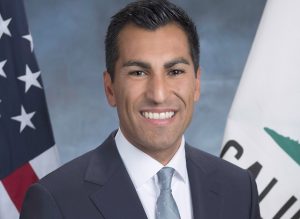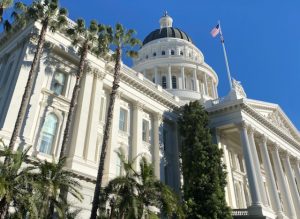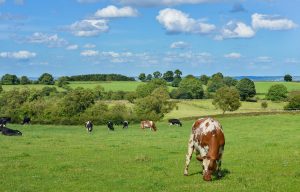Introducing The Declaration for Healthy Food and Agriculture
August 28, 2008 Michael R. Dimock
What follows is a transcript of the first public reading of the final draft Declaration for Healthy Food and Agriculture
By Michael R. Dimock and the Declaration Framers in the Rotunda of City Hall, San Francisco
Thank you all for coming to the first public reading of the Healthy Food and Agriculture Declaration, an effort involving individuals and organizations from all across the nation who seek fundamental improvement in food and farm policy.
My name is Michael Dimock and I am president of Roots of Change. Roots of Change is a collaborative of diverse leaders and institutions unified in common pursuit of a sustainable food system in California by the year 2030. As a coordinating entity across government, non-profit and business sectors, Roots of Change works to maximize the synergy available to those transforming the food system by convening multi-stakeholder planning sessions and supporting collaborative implementation with grants, fellowships, and contracts. We are very pleased to be working with Slow Food Nation and Slow Food USA on this weekend’s events that will awaken the nation to a delicious food revolution now underway.
Roots of Change initiated this document because like many other regions of the nation seeking a better food system, our mission is made more difficult by current federal policy. The crux of the problem is that the preponderance of public investment, as channeled by the farm bill and other food legislation, rests on goals and utilizes incentives that are out of sync with current realities. We live in the 21st century, but our food and farm legislation was framed in the 20th century.
Farm policy was born at the height of the Dust Bowl and Great Depression when many Americans were hungry. At that time, President Roosevelt said the legislation was intended to “rescue agriculture” from the economic and ecological crisis in which it struggled to survive. His policy worked well for many decades. The nation built an increasingly effective system for delivering cheap calories. Our farmers fed the nation and much of the world with those calories.
But there have been unintended consequences for rural communities, for human and ecological health, for farmers and workers, for domestic and wild species. Our policies created a world of commodities and a commodity by its very definition must become cheaper and cheaper over time. As they say, you cannot squeeze blood from a turnip. Our current policies are now squeezing the life out of our nation, by extracting the wealth from our soils and rural communities, by draining the health from our children, and by degrading the complexity and vitally of our ecosystem and food supply.
The good news is that, these challenges can be addressed. People in this room know what to do. And with good policy they will do it. Good policy will make our nation’s farmers, ranchers and food purveyors heroes of the 21st Century.
What we need, is for the nation to once again focus on farmers, agriculture and food in order to systemically solve health, environmental, social and economic problems through addressing root causes. This declaration is meant to awaken all Americans to the need and the promise afforded by focusing on healthy food and agriculture.
In a moment, eight distinguished readers will share what is a final draft Declaration. It is considered a final draft because despite 11 wise framers, a gifted team of writers, and dozens of contributors, sufficient consensus is not yet built. This declaration must be the whole nation’s call to action. Therefore, beginning last evening this document was posted online for 90 days of comment and/or endorsement. At the end of that period the framers and drafters will be reconvened, with others committed to our purpose, to digest and synthesize what has been offered. In December, we plan to issue a final document and then the real work will begin.
We seek to win a minimum of 300,000 supporting signatures from Americans all across the nation, small towns and big towns, rural and urban, from every political party, religious group, and ethnicity. As signatures of support are gathered, we will convene a body of policy experts that will develop a specific set of proposals for programs that reflect the principles found in the declaration. Once that set of recommendations is completed and the signature goals have been achieved, we hope to arrive in Washington with representatives from all geographic regions and all food and system sectors, and in a moment similar to this one, deliver our call for policy improvement. Today marks the beginning of a journey and we hope you, and all those you know, will join us.
Let me now introduce, the Readers
The preamble will be read by Dan Imhoff. Dan is the founder of the Wild Farm Alliance, founder of Watershed Media, and a noted author. His wonderful book, Food Fight: A Citizen’s Guide to a Food and Farm Bill, is but one major reason why Dan is the originating author and primary editor for this project.
The twelve principles will be read by six people. They are
Dr. Marion Nestle, the Paulette Goddard Professor of Nutrition in the Department of Nutrition, Food Studies & Public Health, at New York University. Dr. Nestle is among the nation’s leading health policy analysts and advocates and the author of many books including Food Politics, and most recently, Pet Food Politics. Marion is an original endorser of the Declaration.
Maricala Morales is the Associate Executive Director for the Central Coast Alliance for a Sustainable Economy. Maricela is the former Mayor of Port Hueneme, CA and remains on the city council and is a labor and social justice advocate. Maricela is one of the eleven framers.
Alice Waters, is of course the founder of Chez Panisse, a writer, lecturer, and educator who is presiding over Slow Food Nation and is Vice President of Slow Food International. Alice is one of the eleven farmers.
Keith Bolin is farmer & President of the American Corn Growers Association and is a healthy farm policy reform advocate from the commodity crop state of Illinois. Keith is one of the eleven framers.
Richard Rominger is the former Deputy Secretary of USDA, former Secretary of California’s Department of Food and Agriculture and a healthy farm policy advocate from California, a specialty crop state. Rich is one of the eleven framers.
Wendy Wasserman is the Publisher of Edible Iowa River Valley, one of 50 edible communities publications. She is a consumer advocate. Wendy is a member of the drafting team.
Patty Lovera is the Assistant Director of Food and Water Watch and an environmental and food policy advocate who participated in the last farm bill debate. Patty is a member of the drafting team.
With that may the reading commence, Dan…
Dan Imhoff:
“Declaration for Healthy Food and Agriculture
We, the undersigned, believe that a healthy food system is necessary to meet the urgent challenges of our time. Behind us stands a half-century of industrial food production, underwritten by cheap fossil fuels, abundant land and water resources, and a drive to maximize the global harvest of cheap calories. Ahead lie rising energy and food costs, a changing climate, declining water supplies, a growing population, and the paradox of widespread hunger and obesity.
These realities call for a radically different approach to food and agriculture. We believe that the food system must be reorganized on a foundation of health: for our communities, for people, for animals, and for the natural world. The quality of food, and not just its quantity, ought to guide our agriculture. The ways we grow, distribute, and prepare food should celebrate our various cultures and our shared humanity, providing not only sustenance, but justice, beauty and pleasure.
Governments have a duty to protect people from malnutrition, unsafe food, and exploitation, and to protect the land and water on which we depend from degradation. Individuals, producers, and organizations have a duty to create regional systems that can provide healthy food for their communities. We all have a duty to respect and honor the laborers of the land without whom we could not survive. The changes we call for here have begun, but the time has come to accelerate the transformation of our food and agriculture and make its benefits available to all.
We believe that the following twelve principles should frame food and agriculture policy, to ensure that it will contribute to the health and wealth of the nation and the world.”
Marion Nestle:
“A healthy food and agriculture policy:
1. Forms the foundation of secure and prosperous societies, healthy communities, and healthy people.
2. Provides access to affordable, nutritious food to everyone.”
Maricela Morales:
“A healthy food and agriculture policy:
3. Prevents the exploitation of farmers, workers, and natural resources; the domination of genomes and markets; and the cruel treatment of animals, by any nation, corporation or individual.
4. Upholds the dignity, safety, and quality of life for all who work to feed us.”
Alice Waters:
“A healthy food and agriculture policy:
5. Commits resources to teach children the skills and knowledge essential to food production, preparation, nutrition, and enjoyment.
6. Protects the finite resources of productive soils, fresh water, and biological diversity.”
Keith Bolin:
“A healthy food and agriculture policy:
7. Strives to remove fossil fuel from every link in the food chain and replace it with renewable resources and energy.
8. Originates from a biological rather than an industrial framework.”
Richard Rominger:
“A healthy food and agriculture policy:
9. Fosters diversity in all its relevant forms: diversity of domestic and wild species; diversity of foods, flavors and traditions; diversity of ownership.
10. Requires a national dialog concerning technologies used in production, and allows regions to adopt their own respective guidelines on such matters.”
Wendy Wasserman:
“A healthy food and agriculture policy:
11. Enforces transparency so that citizens know how their food is produced, where it comes from, and what it contains.
12. Promotes economic structures and supports programs to nurture the development of just and sustainable regional farm and food networks.”
Patty Lovera:
“Our pursuit of healthy food and agriculture unites us as people and as communities, across geographic boundaries, and social and economic lines. We pledge our votes, our purchases, our creativity, and our energies to this urgent cause.”
Larry Yee:
“Thank you for being here together at this momentous occasion. I am Larry Yee, the Co-Chair of the Roots of Change Council, a co-founder of the Association of Family Farms, and a recent retiree of the University of California Cooperative Extension Service, where I worked for over two decades to improve our food and farming system, most of that time in Ventura County as County Director. Like my colleagues before you, I was also involved in the formation of this beautiful declaration, as a framer.
Richard Rominger has called the Declaration the “preamble for the next generation of farm policy.” I believe Richard is right. This Declaration for a Healthy Food and Agriculture is an important document, a powerful document that has the opportunity to unite us in common cause at a time that makes it a necessity.
It emerged from a complex, iterative process that began last spring and involved people from the whole nation. I want to thank them for their efforts. First let me acknowledge my fellow framers, who participated in a series of calls that were designed to provide the drafting team a set of ideas and concepts that would frame their words. In addition to Keith Bolin, Maricela Morales, Richard Rominger, and Alice, who have just read, the framers include: Jim Braun (pronounced Brown) from Slow Food USA & the Illinois Local Food and Farm Coalition; Randall Gray, former National Biologist for USDA, Fred Kirschenmann, from the Leopold Center at Iowa State University, Stone Barnes in New York and Kirschenmann Family Farm, Michael Pollan, author and journalist, August Schumacher, former Undersecretary USDA and Commissioner of Agriculture for the State of Massachusetts, and Mark Winne, with the Community Food Security Coalition and an author.
So guided by these distinguished framers, the drafting team wrote several drafts that went back and forth with the framers and an ever broadening circle, which eventually neared 80 people who were asked to comment, many of whom did. The drafting team was led by Dan Imhoff who worked with Patty Lovera and Wendy Wasserman. We also want to acknowledge two special contributing editors. First, Wendell Berry who used the US mail to provide some eloquently crafted suggestions and Michael Pollan who worked over the document in its final stages. Thank you to all these gifted writers.
Please join us and by your simple act of endorsement, indicate your commitment and solidarity. You have ballots within your handheld version of the document. We have ballot box and we have volunteers with pens. We’d love your name, affiliation, email and zip code. Because as Michael explained, we have big plans and you can help us get there. Now, if you are not yet happy with the document, please write a comment across the ballot. We are in the 90-day comment period. We want to hear form you.
Lend your voice to many others across this country, so that together we create the harmony, unity and willingness to finally make sense of the food and farm policies of this country. This is our time.
A good friend and mentor of mine, Dee Hock, once wrote.
“In times such as these, it is no failure to fall short of realizing all that we might dream; the failure is to fall short of dreaming all that we might realize.”
Tonight our dream goes forward.
It is our time…………..



